 Petzlover
Petzlover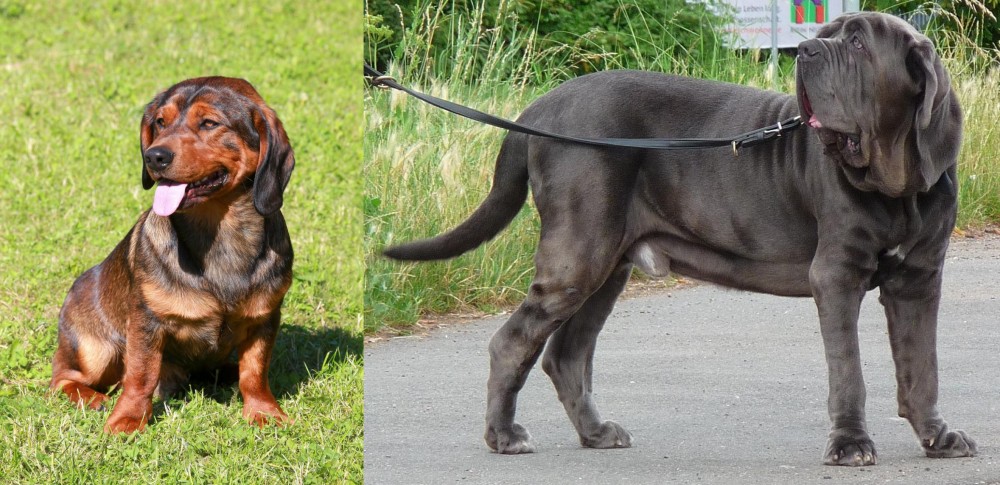 Alpine Dachsbracke is originated from Austria but Neapolitan Mastiff is originated from Italy. Alpine Dachsbracke may grow 30 cm / 11 inches shorter than Neapolitan Mastiff. Alpine Dachsbracke may weigh 61 kg / 134 pounds lesser than Neapolitan Mastiff. Alpine Dachsbracke may live 3 years more than Neapolitan Mastiff. Alpine Dachsbracke may have less litter size than Neapolitan Mastiff. Both Alpine Dachsbracke and Neapolitan Mastiff requires Moderate Maintenance.
Alpine Dachsbracke is originated from Austria but Neapolitan Mastiff is originated from Italy. Alpine Dachsbracke may grow 30 cm / 11 inches shorter than Neapolitan Mastiff. Alpine Dachsbracke may weigh 61 kg / 134 pounds lesser than Neapolitan Mastiff. Alpine Dachsbracke may live 3 years more than Neapolitan Mastiff. Alpine Dachsbracke may have less litter size than Neapolitan Mastiff. Both Alpine Dachsbracke and Neapolitan Mastiff requires Moderate Maintenance.
 They are aggressive enough for hunting and tracking large animals as well as small, but they are gentle enough to bring an injured animal back to the hunter without hurting it more.
They are aggressive enough for hunting and tracking large animals as well as small, but they are gentle enough to bring an injured animal back to the hunter without hurting it more.
At one time the breed was a crown favorite, accompanying Prince Rudolph of Habsburg on his hunting excursions. The Alpine Dachsbracke is still a favorite hunting breed but is now more often found as a family pet.
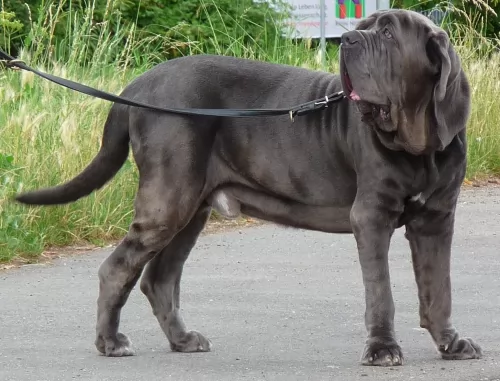 An ancient breed, the Neapolitan Mastiffs are massive dogs with a history of protecting their family and their property. The breed has deep rooted protective instincts and they are very frightening in appearance. The Neapolitan is of the Molosser group of dogs, all of whom probably came from the same line. It is known that all the mastiffs in Europe are descendants of the Tibetan Mastiff. The Tibetan Mastiff is considered the most ancient of all canines.
An ancient breed, the Neapolitan Mastiffs are massive dogs with a history of protecting their family and their property. The breed has deep rooted protective instincts and they are very frightening in appearance. The Neapolitan is of the Molosser group of dogs, all of whom probably came from the same line. It is known that all the mastiffs in Europe are descendants of the Tibetan Mastiff. The Tibetan Mastiff is considered the most ancient of all canines.
The Asian Mastiffs came from India to Greece around 300 BC with Alexander the Great. Then the breed was brought to the Romans by the Greeks and then introduced them in their circus in fights. Another possibility is that around 500 BC the mastiffs came to Britain from the Phoenicians. Either way the Roman Molossus is the ancestor of the Neapolitan Mastiff.
The Romans crossed the breed with the English Mastiff around 55 BC and developed a premiere war dog that was called a Mastini.
The breed eventually became extinct in Europe with the exception of Campania. The breed was recognized in 1946 with the standard accepted in 1949. However, it is believed that the Neapolitan Mastiff has been continuously present in Campania for over two thousand years. The breed was initially developed as war dogs and for the Roman coliseum spectacles.
In 1946 Dr. Piero Scanziani established a program to breed them in Italy. He wrote the breed standard in 1949.
Today the Neo is a farm dog, an army dog, a police dog and a guard dog. They were shown in Italy for the first time in 1946 but only in 2004 was the breed recognized by the American Kennel Club (AKC). It was 1973 when the Neapolitan Mastiff Club of America was born and 1996 when the standard was approved by the AKC. They are still a rare breed in the United States.
 The Alpine Dachsbracke is a short, stocky dog with a long body and short legs. It is big boned and robust with round eyes. It has black toenails and a short, dense red or black coat.
The Alpine Dachsbracke is a short, stocky dog with a long body and short legs. It is big boned and robust with round eyes. It has black toenails and a short, dense red or black coat.
The bridge of his nose is straight with a strong muzzle. Its forehead has a well defined furrow and black lips and nose. He is muscular and his chest is broad and deep. He holds his tail high and has a trotting gait.
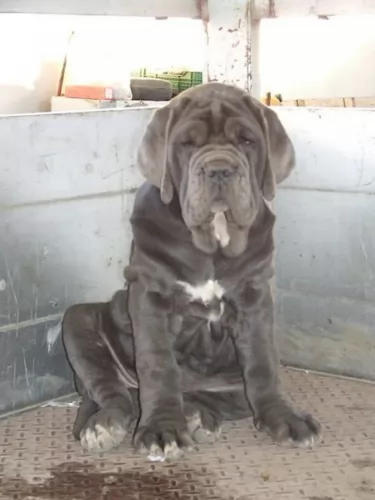 The Neapolitan Mastiff is a massive dog , so powerful and very intimidating in his looks. With an incredibly large head and hanging folds and wrinkles, the Neo is an impressive animal. His inner nobility and dignity is evident in his stance and the way he holds himself. He is relaxed, calm, quiet yet imposing none the less. His coat is dark whether black, tawny, gray or mahogany. He is muscular beyond imagination. The Neo is 10-15% longer than he is tall.
The Neapolitan Mastiff is a massive dog , so powerful and very intimidating in his looks. With an incredibly large head and hanging folds and wrinkles, the Neo is an impressive animal. His inner nobility and dignity is evident in his stance and the way he holds himself. He is relaxed, calm, quiet yet imposing none the less. His coat is dark whether black, tawny, gray or mahogany. He is muscular beyond imagination. The Neo is 10-15% longer than he is tall.
On his massive head his eyes are deep set and covered by his eye lids that droop. His eyes are blue as puppies then dark and coordinated with his coat. and his nose is large and the color of his coat. Ears are natural or can be cropped, and they carry their tail straight and curving back. The Neo has round paws and arched toes.
 The Alpine Dachsbracke is a very lovable family dog even though he was bred to hunt and scent. They are great with kids and at their size are still good apartment, inside dogs. Though they need daily exercise they don’t need a large fenced in yard.
The Alpine Dachsbracke is a very lovable family dog even though he was bred to hunt and scent. They are great with kids and at their size are still good apartment, inside dogs. Though they need daily exercise they don’t need a large fenced in yard.
They are brave, intelligent and with a lot of stamina for the hunt or the walk. Take them on a hunting trip and they will adore you for it. Though they have plenty of power and endurance, they are not aggressive. However they are fearless and proud and need a strong pack leader for their human companion.
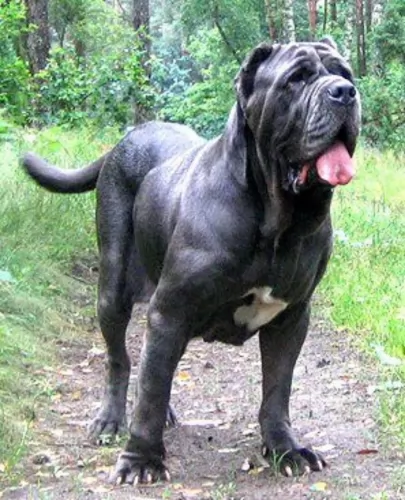 Older children in their family. No toddlers or strangers.
Older children in their family. No toddlers or strangers.
Protective yet quiet, calm, relaxed
No they won’t adapt well to apartment living or to strangers.
They are intelligent and trainable but must be socialized and know the human is the alpha or they will take over.
 They were bred to hunt and so are active dogs needing daily exercise and long walks.
They were bred to hunt and so are active dogs needing daily exercise and long walks.
They are at risk for back problems being long-backed dogs. The most common type of back problem is Intervertebral Disc Disease. This can cause pain and paralysis and can be caused by jumping, obesity or intense exercise.
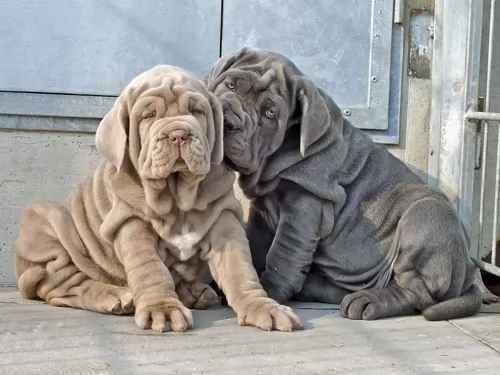 The Neapolitan Mastiff is prone to many of the same issues as any massive, extra large breed. The most common of these is Cherry Eye.
The Neapolitan Mastiff is prone to many of the same issues as any massive, extra large breed. The most common of these is Cherry Eye.
 Whether a puppy or adult the breed is subject to obesity and needs to be fed a good, vitamin filled dry dog food. At the same time they need the calories if they are active or hunting.
Whether a puppy or adult the breed is subject to obesity and needs to be fed a good, vitamin filled dry dog food. At the same time they need the calories if they are active or hunting.
About one quarter to one half cup twice a day.
About one half cup twice a day until they become seniors or less active then reduce to a fourth of a cup twice a day.
The Alpine Daschbracke was bred to work. He needs exercise at least a couple times a day.
This breed is playful and loves to find and retrieve. Daily exercise is essential.
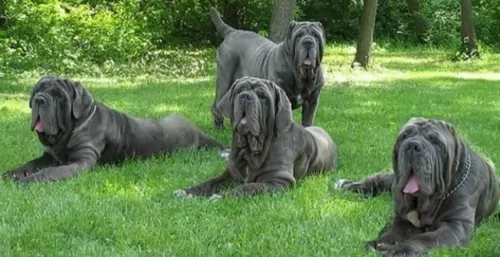 Neapolitans grow fast and so don’t overfeed when they are young. Lower protein and higher fat content.
Neapolitans grow fast and so don’t overfeed when they are young. Lower protein and higher fat content.
Don’t overfeed the adult as they can become obese.
This big hearty breed needs exercise but not too much. They overheat easily. The puppy will push himself, so you have to make sure he doesn’t over do it. No tug of war games. They need a long walk twice every day.